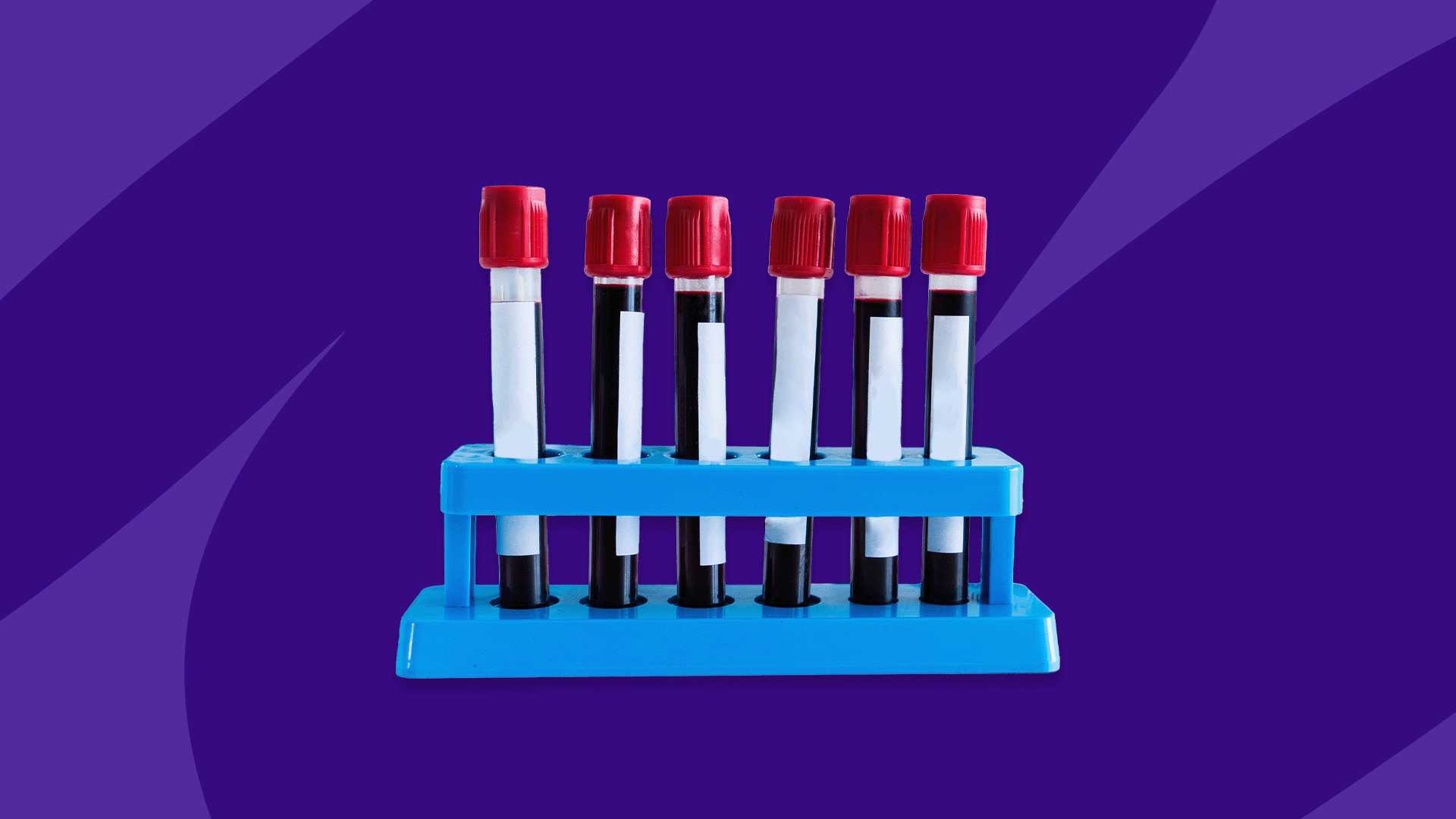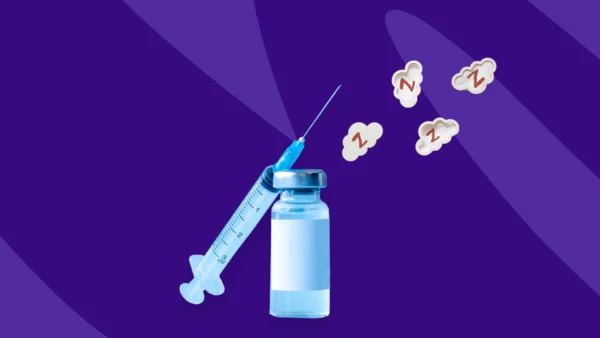Key takeaways
Blood types are determined by the presence of antigens and the Rh factor on red blood cells, which are crucial for safe blood transfusions and understanding health risks.
There are eight main blood types, categorized under the ABO and Rh factor systems, with O+ being the most common in the U.S. and Western Europe, and AB- being the rarest.
Certain blood types may increase the risk of specific diseases; for example, type O blood is associated with a lower risk of heart disease and certain types of cancer.
Despite popular beliefs, there is no scientific evidence linking blood type to diet effectiveness or personality traits.
Blood types | Blood type rarity chart | How to find out blood type | How blood type is determined | Blood type compatibility | Healthiest blood types | Blood type diet | Blood type personality
If all you know about your blood is that it’s red, you have some catching up to do.
Blood is made up of a lot of different components. There are red and white blood cells, which carry oxygen and help fight infection, respectively. There are platelets, which help your blood clot. And there’s plasma, which provides the body with things like nutrients and hormones. Your plasma contains antibodies, which are substances your immune system uses to fight foreign invaders like germs and bacteria.
Your blood also contains antigens. These are proteins and other molecules present on the outside of your red blood cells; they determine what type of blood you have. Blood is further classified by its rhesus factor (aka, Rh factor). If your blood contains the Rh D factor—the most prevalent and important of the Rh factors—you have a positive blood type. If your blood lacks it, you have a negative blood type.
Categorizing blood according to type is important for things like blood transfusions, which replace blood that’s lost through surgery, accidents, and bleeding disorders. Mixing one type of blood that’s incompatible with another—thanks to things like antigens and Rh factor—can be fatal.
Healthy blood is essential for a healthy life. From typing to transfusing, here’s what you need to know about your blood and your health.
How many different blood types are there?
The vast majority of people have one of eight blood types. Blood types are based on the antigens (or lack of them) found in your blood cells and whether or not your blood contains the Rh D factor. Blood is typed according to an ABO blood group system. If your blood has A antigens, you have an A blood type. If you have B antigens, you have a B blood type. Some people have both A and B antigens, giving them AB blood. And people with an O blood type have neither A nor B antigens.
Each of those types are further broken down based on their Rh factor. For example, some people have A positive blood while others have A negative. A very small number of people have what’s called Rh null blood (also called gold blood), meaning it has no Rh factors at all. This is extremely rare, occurring in only a handful of people worldwide.
You may have the blood subtype Ro (a special marker on your red blood cells) if you are Rh positive. That means your blood type could be A+, B+, AB+ or O+. The Ro subtype is most common among African Americans (44%), and because this ethnic group is most likely to develop sickle cell disease, Ro subtype blood is more likely to be needed for blood transfusions. It takes 20 donors to provide enough blood for each sickle cell patient.
What is the most common blood type?
How common or rare a blood type is varies by race, ethnic background, and what part of the world you live in. According to the book Blood Groups and Red Cell Antigens, blood type B is common in people in Asia while blood type A is common in Central and Eastern Europe. In the U.S. and Western Europe, O positive is the most common blood type, as is having a positive Rh factor. AB negative is the rarest. What about the rest of the blood types? The Stanford Blood Center provides these blood type percentages.
Blood type by rarity |
|
|---|---|
| Blood type | Percentage of Americans with blood type |
| O+ | 37.4% |
| A+ | 35.7% |
| B+ | 8.5% |
| O- | 6.6% |
| A- | 6.3% |
| AB+ | 3.4% |
| B- | 1.5% |
| AB- | 0.6% |
What’s my blood type? How to find out
There are three ways you can find out your blood type.
- Your healthcare provider can order a blood type test.
- You can donate blood. A typing test will be done and the results sent to you.
- You can purchase an at-home blood typing test. These tests usually involve pricking your finger and putting a drop of blood on a chemically treated card that looks for antigens and the Rh factor. You then match what you see on the card to a provided guide. Other tests may involve a saliva sample.
These tests aren’t foolproof, though. “There are certain scenarios in which we find discrepancies in our blood typing,” says Deva Sharma, MD, MS, a hematologist-oncologist at Vanderbilt University Medical Center in Nashville. “This can occur in a person with a blood cancer, for example, or in someone who has had a recent blood transfusion or stem cell transplant.”
What your blood type says about you
What does your blood type say about your heritage?
Your blood type is inherited from your parents—and you can’t change it any more than you can change your eye color.
Each parent contributes one of their two A, B, or O alleles (a form of a gene) to a baby’s blood type. The O allele is considered recessive, which means it’s not always expressed. So if a woman with OO alleles has a baby with a man who has BB alleles, the baby will have a B blood type.
Can a baby ever have a blood type different from its parents? “There are certain scenarios in which we find discrepancies in our blood typing,” Dr. Sharma says. “For example, an AO mother will have blood type A, and a BO father will have blood type B. However, there is a 25% chance they could have a baby with the blood type O (with inheritance of the OO alleles), and a 25% chance they could have a baby with an AB blood type (with inheritance of the A allele from the mother and the B allele from the father).”
What other combinations can occur? Emory University School of Medicine put together this chart:
| Parent #1’s alleles | Parent #2’s alleles | Baby’s blood type |
| AA or AO (Type A) | AA or AO (Type A) | Type A or O |
| AA or AO (Type A) | BB or BO (Type B) | Type A, B, AB, or O |
| AA or AO (Type A) | AB (Type AB) | Type A, B, or AB |
| AA or AO (Type A) | OO (Type O) | Type A or O |
| BB or BO (Type B) | BB or BO (Type B) | Type B or O |
| BB or BO (Type B) | AB (Type AB) | Type B, A or AB |
| BB or BO (Type B) | OO (Type O) | Type B or O |
| AB (Type AB) | AB (Type AB) | Type A, B, or AB |
| AB (Type AB) | OO (Type O) | Type A or B |
| OO (Type O) | OO (Type O) | Type O |
Your Rh factor is also inherited, and like your blood type, you inherit one of two Rh alleles from each parent. So a baby receiving an Rh-positive allele from each parent will be Rh positive, and one receiving a negative Rh allele from each parent will be Rh negative. If you have one positive and one negative Rh allele (making you Rh positive, as the Rh-negative allele won’t be dominant), you could pass either one down to your child. Whether or not your baby will be Rh positive or negative will depend on what is also passed down by the other parent.
Who can I donate blood to?
While it seems counterintuitive, knowing your blood type isn’t absolutely critical. “Surprisingly, many people go through their entire lives without knowing their blood type and it causes them no harm,” says Jerry E. Squires, MD, Ph.D., a professor at the Medical University of South Carolina in Charleston. “Why? Because no hospital is going to transfuse a patient without first doing tests to determine the patient’s blood type. And, no, a hospital will not take a patient’s word for their blood type. I know that I am blood group A, but if I need blood, tests are going to be done first to make sure of my type and that safe red blood cell units are selected for my transfusion.”
Getting transfused with a type of blood that isn’t compatible with yours can be deadly. That’s because antibodies in the foreign blood can trigger an immune response to attack against it, causing a cascade of problems. What blood types are compatible and which ones aren’t? According to Stanford Blood Center, safe combinations include:
Blood type compatibility chart |
||
|---|---|---|
| Blood type | Can donate blood to | Can receive blood from |
| A+ | A+, AB+ | A+, A-, O+, O- |
| A- | A-, A+, AB-, AB+ | A-, O- |
| B+ | B+, AB+ | B+, B-, O+, O- |
| B- | B-, B+, AB-, AB+ | B-, O- |
| AB+ | AB+ | AB+, AB-, A+, A-, B+, B-, O+, O- |
| AB- | AB-, AB+ | AB-, A-, B-, O- |
| O+ | O+, A+, B+, AB+ | O+, O- |
| O- | O-, O+, A+, A-, B+, B-, AB+, AB- | O- |
RELATED: Can I donate blood? Who can donate blood—and who can’t
What’s the best blood type to donate?
What happens if you’re in an emergency with no time for a blood type test? You’ll receive O- blood. Without any antigens or Rh D factor, O- blood is compatible with all other blood types. For that reason, people with O- blood are referred to as “universal donors.”
According to the American Red Cross, every two seconds someone in this country needs a blood transfusion. That makes blood donations particularly critical. “If you’re healthy, please be a blood donor,” Dr. Squires urges. “There is no substitute for blood, and if people don’t donate we will run out. That would mean no surgeries, no transplants, and no treatment for traumas.”
What is the healthiest blood type?
Can your blood type make you prone to certain diseases? While some experts say any possible effect blood type plays on health is insignificant at best, others say there’s a valid connection.
“The ABO antigens that make up our blood type are not only expressed on the surface of red blood cells, but they are also present in other human tissues as well,” says Dr. Sharma. “This provides the basis for ABO blood type to have clinical significance for various health outcomes outside the blood system.”
What might some of those health outcomes be? According to Northwestern Medicine, studies show that:
- People with type O blood have the lowest risk of heart disease while people with B and AB have the highest.
- People with A and AB blood have the highest rates of stomach cancer.
- People with type A blood can have a harder time than others managing stress because they often produce more of the stress hormone cortisol.
- People with A and B blood types are at higher risk of developing blood clots than type O. They are also 51% more likely than those with type O blood to develop deep vein thrombosis.
- People with type O blood are more likely to experience more difficulty trying to conceive due to diminished ovarian reserve, or lower quality and fewer eggs than is normal.
- People with AB blood may be at greater risk of developing memory loss that leads to dementia later in life than those with other blood types.
- People with A, B or AB blood may be at greater risk of diabetes than those with type O blood. In one study, people with B+ blood were at 35% increased risk of developing diabetes, followed by AB+ at 26% increased risk, A- at 22%, and A+ at 17%.
- People with A, B or AB blood may be at greater risk of certain cancers, including prostate, breast, colorectal, lung, liver, and cervical cancers than those with type O blood. The same is true of pancreatic cancer—people with type O are at a lower risk of developing the disease than those with A, B, or AB blood types
But when it comes to blood type and COVID-19 patients—the disease of the moment—there’s good news. According to a recent study from Harvard Medical School researchers published in the journal Annals of Hematology, blood type has no effect on how sick one becomes with coronavirus (despite initial claims that it might).
Are their diets based on blood type?
Naturopathic doctor Peter D’Adamo, ND, came up with a weight loss plan known as the blood type diet. This eating plan says a person should eat according to their blood type. For example, if you have type A blood, you’d eat a vegetarian diet. If you have B blood, you can eat most foods, and those with type O blood should only consume protein and vegetables.
But a study published in the Journal of the Academy of Nutrition and Dietetics found that blood type had no effect on body weight, body fat percentage, plasma lipid concentrations, or glycemic control in individuals consuming a plant-based diet, thereby debunking the merits of the blood type diet.
Does blood type affect personality?
You may be wondering whether your blood type predicts your personality traits. While this is a popular belief, there is no scientific evidence to support the idea. In fact, according to a recent study, no correlation was found between personality and blood type. Similarly, research has found no significant correlation between blood type and intelligence.











